Monroe Bourne was athletically active in track and field and water polo, but it was in swimming that he had the most success. He took up the sport at the Montreal Amateur Athletic Association and entered the city’s McGill University in 1927, quickly joining their collegiate aquatic squad. The following year he was selected to represent Canada at the 1928 Summer Olympics, where he won a bronze medal in the 4x200 metre freestyle relay, alongside Garnet Ault, Walter Spence, and Jimmy Thompson. He was also eliminated in the opening round and the semifinals of the 100 metre freestyle and backstroke events respectively. Two years later he attended the inaugural 1930 British Empire Games and captured gold in the 100 yards freestyle and the 4x200 yard freestyle relay (with Thompson and the non-Olympians George Burleigh and Bert Gibson), while finishing sixth in the 400 yards freestyle.
Bourne graduated from McGill in 1931 with degrees in English and political science and received a Rhodes Scholarship in 1932 to study at Oxford University. Before leaving for England, he made an appearance at the 1932 Summer Olympics, where he was fourth in the 4x200 m freestyle relay (alongside Spence, George Burrows, and George Larson) and was again eliminated in the opening round and the semifinals of the 100 m freestyle and backstroke. He came back to McGill in 1935 and earned a medical degree two years later. In between he took part in his final edition of the Olympic Games, this time as team captain, placed seventh in the 4x200 m freestyle relay (with Bob Hamerton, Robert Hooper, and Bob Pirie) and was eliminated in the opening round of the 100 m freestyle and backstroke events. He served with the Canadian Army during World War II, eventually being discharged with the rank of Major, and worked the rest of his life as a doctor. He was inducted into the McGill Athletics Hall of Fame in 1996.

 Canada
Canada CAN
CAN CAN
CAN CAN
CAN